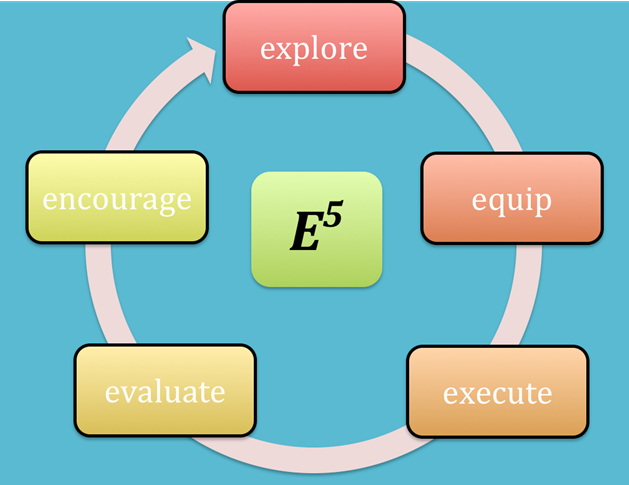A Coaching Model Created by Gail Cameron
(Academic & Career Coach, UNITED STATES)

Explore
is generally the first phase of the coaching process and helps the client gain greater self-awareness in relation to the goal(s) they desire to attain. Through conversation and interactive activities the client will gain greater clarity regarding their goals and a realistic understanding of what will be required to achieve their objective(s). The exploration phase also helps the coach and the client build rapport and increase self awareness to understand their values, underlying beliefs, strengths, weaknesses, potential obstacles as well as possible outcomes.
Equip
coaching phase guides the client to develop a realistic plan they can commit to by preparing for the challenges to reach the desired outcomes. Client considers the available resources to move forward and include: available assets, determining experts that can be of assistance to succeed and timelines. One of the greatest risks to success is being overly confident and not preparing for the
worst outcome. Therefore a part of the equip phase is helping the client identify and prepare for worst case scenarios. The coach assists in this process by helping the client consider possible outcomes, obtain information from “experts” and developing contingency plans for various outcomes.
Execute
Execute is the action phase of the plan to achieve desired objectives. The coach helps the client be accountable to implement the plan and resolve expected and unexpected obstacles. The coach also serves to support the client by listening to the client’s emotions and points of frustration that can slow the client down and prevent them from achieving their goal(s).
Evaluate
This evaluate phase of the coaching process is an on-going reflective component of the execution phase. As the client implements their plan, feedback and reflection will be interspersed to determine the plan’s effectiveness and if client’s objectives were met.
Encourage
Encouragement, similar to the evaluation phase, is an integrated component of the Excel model and is not intended to occur once in a cycle. In a collaborative fashion, the coach and client each play a role to accentuate the positive actions occurring. The client will have the opportunity to share their successes and the coach, words of acknowledgement to move the client forward with positive reinforcement.